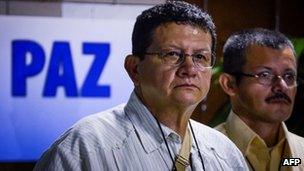Colombia Farc rebels in 'unification' talks with ELN
- Published

Farc leaders resumed peace negotiations with the Colombian government in Havana on Monday
Colombia's largest armed rebel groups, the Farc and ELN, have met "to strengthen" their "unification process".
In a statement, the Farc says "incidents which led to the distancing between the groups" have been overcome.
The development comes as Farc leaders resume peace negotiations with the Colombian government in Cuba.
They are discussing how Farc could enter politics if a deal is reached to end five decades of conflict.
According to the Farc statement, the meeting with the ELN (National Liberation Army) at an undisclosed location discussed the need to "work for the unity of all political and social forces" involved in changing the country.
The two groups have clashed in the past but have recently joined forces in armed operations against government targets in Colombia.
Land reform deal
The ELN - Colombia's second largest group - is not part of the peace talks in Cuba.
But its leaders have made clear they would like to participate.
Talks between the Colombian government and the Farc resumed in Havana on Monday on the second key issue on the peace agenda: how to bring the rebel group into the political process after a future peace deal.
They reached an agreement on land reform late in May.
Farc leaders want general elections be put back a year, to 2015, to allow for a constituent assembly to draw up Colombia's political future.
But the government has warned it will only discuss the previously agreed agenda.
"The political participation discussion is only over these issues. This is what the government is ready to discuss and nothing else," Colombia's chief negotiator, Humberto de la Calle said.
Landmark peace negotiations have been going on in Cuba for more than six months.
The Farc is thought to have some 8,000 fighters, down from about 16,000 in 2001, while the government says the ELN has fewer than 1,500 men.
Hundreds of thousands of people have been killed since the conflict began in the 1960s, with some three million more internally displaced by the fighting.
- Published27 May 2013
- Published27 May 2013